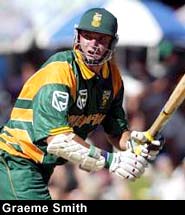A whinge on sledging
Daniel Laidlaw
Last month, South African batsman Graeme Smith added to comments made previously when he expounded upon the topic of Australian sledging in the South African Sports Illustrated magazine. According to reports, Smith claimed in the magazine that he was told he "wasn't f****** good enough," was a "f****** c***" and that Brett Lee threatened to kill him.
While slightly hypocritical in that it came from a South African who himself admitted was "no angel," Smith brought fully into the open something that is usually discussed through allusion and euphemisms, if acknowledged at all. Over the course of the few weeks leading up to the winter ODI series, Smith's allegations met with a range of Australian responses, from the traditional "what happens on the field, stays on the field" (McGrath), ignorance of sledging having occurred (Bevan), to the more surprising "working on the problem" (captain Ponting).
 The first two are typically shallow responses to an issue that raises its head from time to time before fading away until the next accusation. The convenient mantra "what happens on the field, stays on the field," which curiously is not found in the ICC laws or official player codes of conduct, ensures that anyone breaking the "code" is seen as the disreputable party. Typically, they are portrayed as whingers who weren't tough enough to handle the pressure. In Smith's case, that is easily refuted.
The first two are typically shallow responses to an issue that raises its head from time to time before fading away until the next accusation. The convenient mantra "what happens on the field, stays on the field," which curiously is not found in the ICC laws or official player codes of conduct, ensures that anyone breaking the "code" is seen as the disreputable party. Typically, they are portrayed as whingers who weren't tough enough to handle the pressure. In Smith's case, that is easily refuted.
Smith's scores, from his debut in both Tests and ODIs, were 3, 68, 1, 41 (Tests) and 41, 46, 84 and 73 (ODIs), not the form of someone who couldn't take the heat. From that perspective, he has surely "earned" the right to comment, though this was disputed by McGrath: In remarks reported by AAP, McGrath implied it was impertinent of Smith to comment, since he had only played a handful of games. Presumably, Smith doesn't have the authority to criticise his betters.
The easiest response is to claim ignorance, for if you don't know it's happening then you don't have to justify it. The novel reply came from Ponting, who admitted in a report in The Australian that sledging existed, but that the Australians had made a conscious effort in the last two years to clean it up as much as possible.
"We're not there yet, we're not where we'd like to be, but we're certainly going to work on that and certainly improve that as much as we can in the short term," said Ponting, doing his best impression of the UN addressing world hunger. One almost expects to hear of an ACB initiative announcing a plan to have sledging at an irreducible minimum by 2015.
Smith was having none of it, following up by calling the Australian response to his allegations "pretty pathetic". In fact, not only did Smith see his own comments as part of an honest review of his international debut rather than whingeing, he even accused the Australians of whingeing about his revelations, while adding, "I have no complaints about what the Aussies did to me" on his debut.
In a report in the Sydney Morning Herald, Smith was quoted as saying: "The problem is that in the past everyone has been too frightened of the Aussies to speak out. And now that someone has said something, they don't know how to deal with it. It's time the Aussies woke up to the fact that they can't always call all the shots." Judging from the responses, he's dead on.
The ACB said they overlooked Smith's claims because the umpires of the time took no action.
Yes, these are the same umpires who are supposed to be adhering to strict new laws on player behaviour. Umpires, as we know, are always right, so no investigation was necessary.
 With the alleged sledging having taken place largely in the ODI series in South Africa and with the series against Pakistan looming, the long-standing question of Australian sledging represented Ponting's first real public relations test since assuming the ODI captaincy. Ponting's initial comments played down the issue, which drew a rebuke from ICC CEO Malcolm Speed, after which he tried to take a more diplomatic line. It's a very simple issue, though, and not the complicated undertaking Ponting made out. Either you're still willing to sledge people or you're not.
With the alleged sledging having taken place largely in the ODI series in South Africa and with the series against Pakistan looming, the long-standing question of Australian sledging represented Ponting's first real public relations test since assuming the ODI captaincy. Ponting's initial comments played down the issue, which drew a rebuke from ICC CEO Malcolm Speed, after which he tried to take a more diplomatic line. It's a very simple issue, though, and not the complicated undertaking Ponting made out. Either you're still willing to sledge people or you're not.
And, by sledging, we are not referring to humorous quips, byplay, and other forms of traditional interaction used to distract an opponent, which admittedly can become a grey area. "Sledging" is defined here only in the sense of outright abuse without redeeming features of the type that Smith alleged, which should be easily distinguishable from banter or common swearing.
There is little reason to believe there is not at least a basic element of truth in Smith's comments, even in the likelihood that he exaggerated to make a point. A couple of McGrath's remarks towards him were even detected by the stump microphones for all to hear.
Sledging is the sort of outdated tactic that one would have thought a modern coach like John Buchanan would have eliminated. Despite its purported use as a legitimate (and yet deniable) psychological warfare tactic, as if sledgers were the FBI in Waco, sledging betrays an inherent insecurity and sense of inferiority, which the Australians really should have shaken off by now. If players were truly confident of their ability, it wouldn't be necessary to insult opponents, as their weaknesses could be exploited through superior play. Sledging, in its worst sense, is motivated by fear and weakness, which could be one reason it has been a traditionally sensitive topic.
This is not Aussie-bashing for the sake of it. The Australians are a brilliant team, probably one of the best in history, who have done more than anyone to revitalise Test cricket. They are deserving of much praise and have received it. However, like any side they are not flawless, which Ponting himself has admitted. Sledging is one unneeded flaw, and they can stop it any time they choose.
More Columns
Mail Daniel Laidlaw